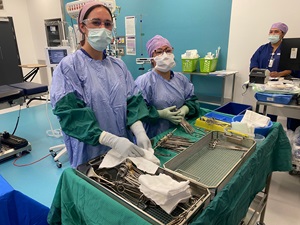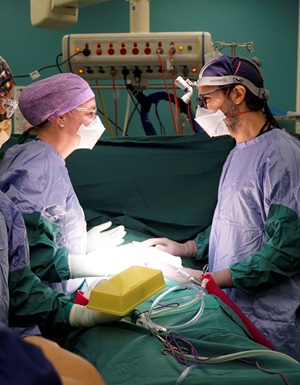2024 | Volume 25 | Issue 6
With global warming nearing the critical 1.5ºC threshold and extreme weather becoming more frequent across Australia, Aotearoa New Zealand, and the Pacific, it’s time for action. The Environmental Sustainability in Surgical Practice Working Party (ESSPWP) is driving important change to reduce healthcare emissions without compromising patient safety. Set up by Professor David Fletcher, the ESSPWP has broadened its scope under the leadership of Dr Ben Dunne, with an expanded scope and innovative new sub-committees and focus.
Research-driven solutions
To ensure sustainable changes don’t compromise patient care, the Research Sub-Committee, led by Dr. Russell Hodgson, is laying the groundwork for evidence-based solutions. This sub-committee is collaborating with registrar and medical student research groups to foster environmental studies. The importance of environmental sustainability was highlighted in several sessions at this year’s Annual Scientific Conference and General Surgeons Australia (GSA) conference. We will share updates and findings in Surgical News and Fax Mentis on this important work as it gains momentum.
Empowering the workforce through education
Sustainability starts with knowledge and ESSPWP is committed to educating the surgical community. Professor Margaret Schnitzler’s Teaching and Education Sub-Committee is developing CPD-accredited micro-learning modules, due for a mid-2025 launch. These resources will equip surgeons, Trainees, and allied health staff with practical strategies to reduce emissions without compromising care.

Collaborating with Industry for sustainable tools
Single-use instruments contribute significantly to surgical emissions. Recognising this, Dr. Hayden Snow’s Industry Engagement Sub-Committee is working closely with the Medical Technology Association of Australia (MTAA) and major suppliers. Together they aim to drive innovation in reusable and sustainable instruments, while maintaining the highest standards of patient care.
Advocacy for national impact
The ESSPWP is collaborating with other medical colleges and the National Health Sustainability and Climate Unit to push for sustainability nationwide. By representing RACS at key committees—Climate and Health Multi-College Advisory Committee in November and the Multi-College Working Group on Climate Change and Health in December—it is helping to create plans to cut emissions and ensure consistent, high-quality care.

Change is already happening. Dr Stanley Chen’s work through New South Wales’ Net Zero Hubs Program has shown promising results in using reusable surgical items. Similarly, reusable surgical gowns and drapes are making a comeback, thanks to a position paper co-developed by RACS, The Australian College of Perioperative Nurses (ACORN), and The Australasian College for Infection Prevention and Control (ACICP).
Be part of the change
The ESSPWP invites you to join this movement toward a sustainable future. By combining research, education, and industry collaboration, we can be leaders in reducing healthcare emissions while maintaining the highest standards of patient care.
Email us: [email protected]
Further reading
Other recent worldwide literature that are worth a read include:
Sterile Draping of Operative Microscopes in Breast Free Flaps: Are We Covering up Ineffectiveness? Julian K Marable,et al. Plast Reconstr Surg Glob Open. 2024 Jan 8;12(1 Suppl 1):30-30. doi: 10.1097/01.GOX.0001006004.27414.f6
Reducing Unnecessary Instruments in Tonsil Hemorrhage Trays at a Canadian Tertiary Care Center: A Quality Improvement Project. Kylen Van Osch, et al. J Otolaryngol Head Neck Surg. 2024. doi: 10.1177/19160216241267719.

